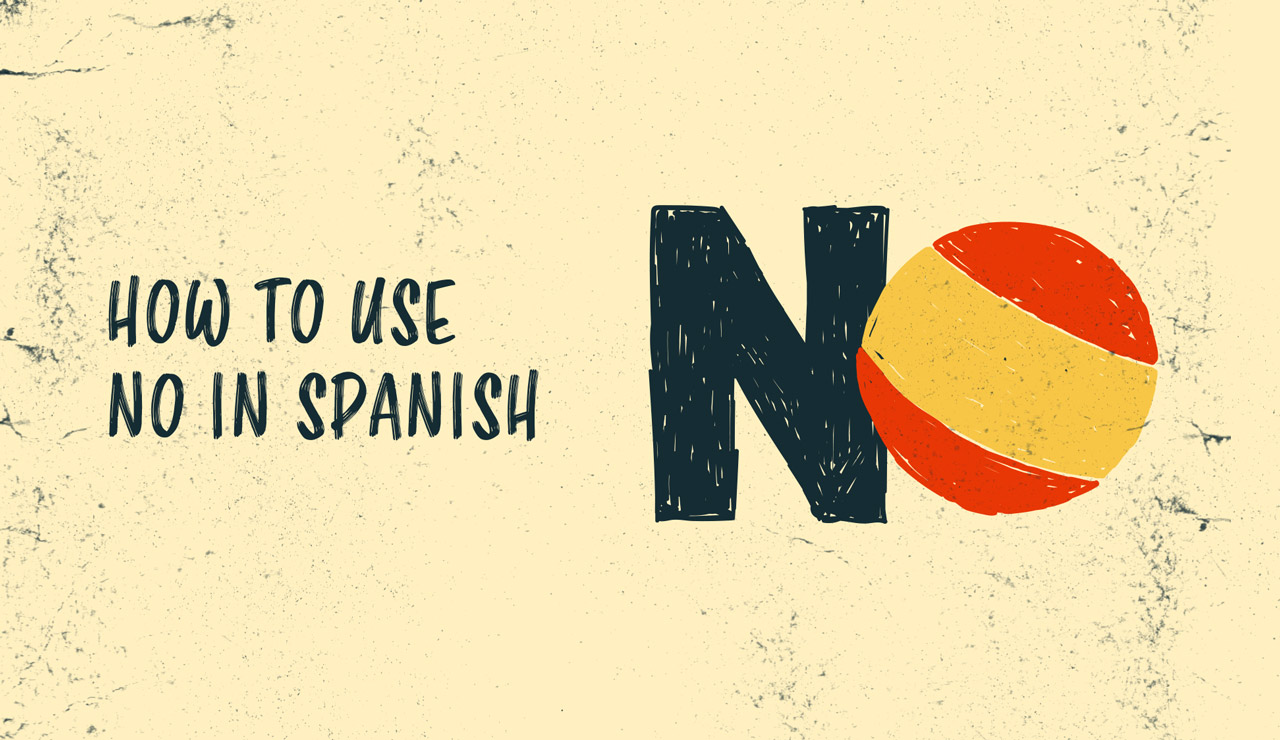Saying “No” in Spanish: How to Use “No” and Other Negatives
How do you say “no” in Spanish? It’s actually very easy! This is because it’s about the same as English: no!
But that’s not all you need to know about no if you want to advance your Spanish abilities. I’ve been learning Spanish for years, and I’ll tell you how to use no as well as more creative phrases to use.
Table of contents
How to Use No in Spanish
The easiest way to say “no” in Spanish is just by saying no. But that’s not all no can do! No is a very useful word in Spanish because it’s a common word that functions as the English “no” and “not.”
So put it simply, no has two uses:
- No is the opposite of sí, which means “yes.”
It’s two for one!
Here’s a dialogue example showcasing both uses:
A: ¿Quieres ir al cine mañana? (“Do you want to go to the movie theater tomorrow?”)
B: No, no tengo tiempo. (“No, I don’t have time.”)
The first no was like the English “no.” The second no acted like “don’t.”
(By the way, if you wanted to say B’s sentence in the affirmative, you could say, Sí, tengo tiempo. (“Yes, I have time.”))
The great thing about negating verbs in Spanish is that you don’t need to worry about whether to use “do not,” “don’t,” “does not,” “doesn’t” or any other variations of a helping verb. You simply add no!
Here’s me at La Sagrada Familia in Spain. Book early, or no vas a entrar (“you won’t get in”)!
Other Ways to Negate a Sentence in Spanish
Of course, there are more ways to make a sentence negative than just saying no in Spanish. Here’s a rundown of other ways to negate a sentence:
| English | Spanish | Pronunciation | Audio |
|---|---|---|---|
| No | No | /no/ | |
| Nothing | Nada | /ˈna.ða/ | |
| No one, nobody | Nadie | /ˈna.ðje/ | |
| Never, not ever | Nunca, jamás | /ˈnun.ka/, /xaˈmas/ | |
| No, None, not any | Ningún, ninguno, ninguna | /ninˈɡun/, /ninˈɡu.no/, /ninˈɡu.na/ | |
| Neither, not either | Tampoco | /tamˈpo.ko/ | |
| Neither… nor… | Ni… ni… | /ni/ |
Now how do we use these words? Here are some example sentences:
- No quiero nada. (“I want nothing.”)
- Nadie vino a la fiesta. (“Nobody came to the party.”)
- Nunca he visitado España. (“I have never visited Spain.”)
- Jamás te olvidaré. (“I will never forget you.”)
- No tengo ningún problema. (“I have no problem.”)
- No conozco a ninguno de ellos. (“I don’t know any of them.”)
- No tengo ninguna idea. (“I have no idea.”)
- Yo no quiero ir y ella tampoco. (“I don’t want to go and neither does she.”)
- No quiero ni pizza ni pasta. (“I want neither pizza nor pasta.”)
Note that in Spanish, when you use a negative word from the list above before the verb, you don’t add no! But if the word comes after the verb, you need to also include no. English doesn’t like double negatives, but sometimes they’re necessary in Spanish!
Also, here are a few more things to keep in mind:
- Nunca is the most common way to say “never.” Jamás is a bit more dramatic or poetic.
- Ningún is used exclusively before masculine singular nouns.
- Ninguno is used for masculine nouns, either as a standalone or after the noun has been omitted.
- Ninguna is the feminine equivalent of both ningún and ninguno, used for feminine nouns.
Other Ways to Express “No” in Spanish
Of course, like in English, there are many ways to express the idea of “no” in Spanish! Here are some more creative and advanced ways to spice up your Spanish vocabulary:
| English | Spanish | Pronunciation | Audio |
|---|---|---|---|
| No thanks. | No, gracias. | /no ˈɡɾa.sjas/ | |
| Of course not. | Por supuesto que no. | /poɾ suˈpwes.to ke no/ | |
| Of course not. | Claro que no. | /ˈkla.ɾo ke no/ | |
| Obviously not. | Obvio que no. | /ˈobβ.jo ke no/ | |
| Not at all. | Para nada. | /ˈpa.ɾa ˈna.ða/ | |
| Negative. | Negativo. | /ne.ɣaˈti.βo/ | |
| No way. | Ni de broma. | /ni ðe ˈbɾo.ma/ | |
| No way. | Ni hablar. | /ni aˈβlaɾ/ | |
| No way. | Nada de esto. | /ˈna.ða ðe ˈes.to/ | |
| No way. | De ninguna manera. | /de ninˈɡu.na maˈne.ɾa/ | |
| No way. | Qué va. | /ke ˈβa/ | |
| Don’t even think about it. | Ni lo pienses. | /ni lo pjenˈses/ | |
| I wish. | Ya quisiera. | /ja kiˈsje.ɾa/ | |
| Don’t even think about it. | Ni se te ocurra. | /ni se te oˈku.ra/ | |
| In your dreams. | Ni en tus sueños. | /ni en tus ˈswe.ɲos/ | |
| By no means. | Bajo ningún concepto. | /ˈba.xo ninˈɡun konˈsep.to/ |
All to Know about “No” in Spanish
So there you have it! You won’t use No entiendo (“I don’t understand”) about “no” anymore! You now know how to turn down offers or ideas in Spanish. Now go out there and start rejecting like a Spanish pro (but please do it nicely!).




Social